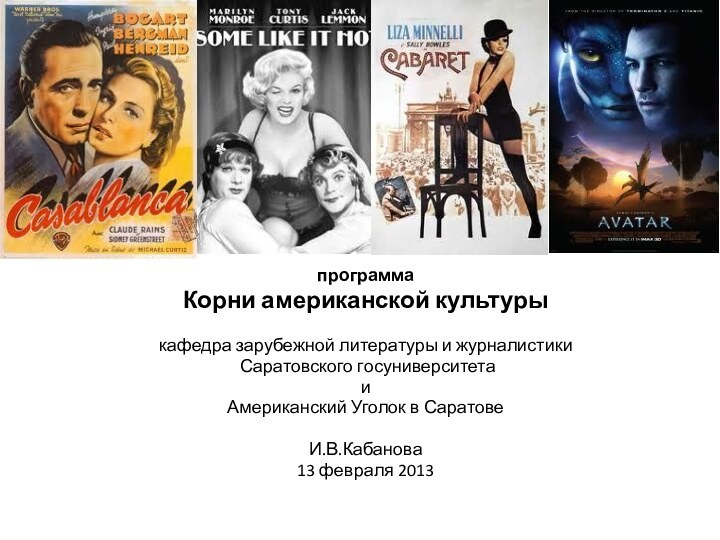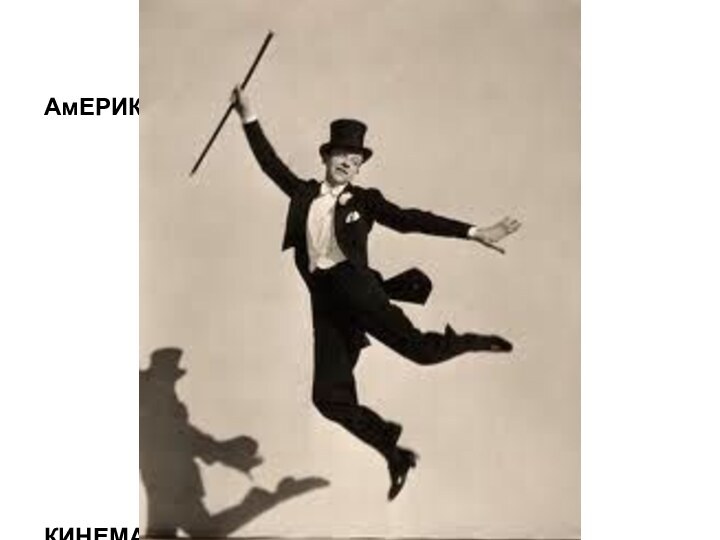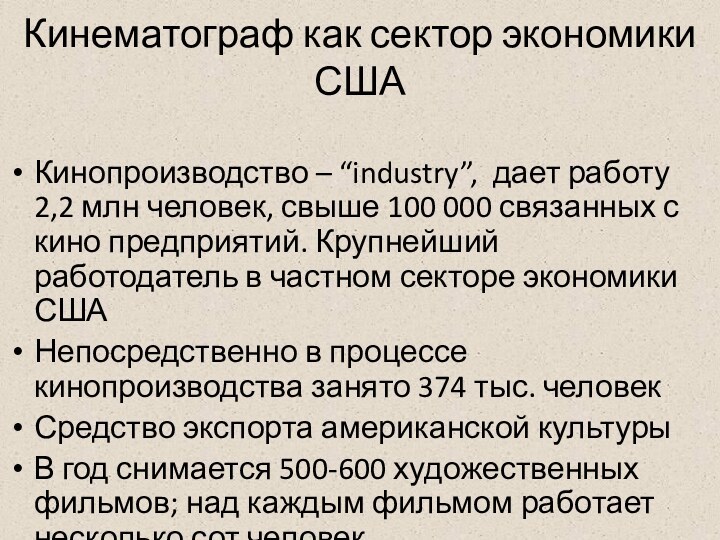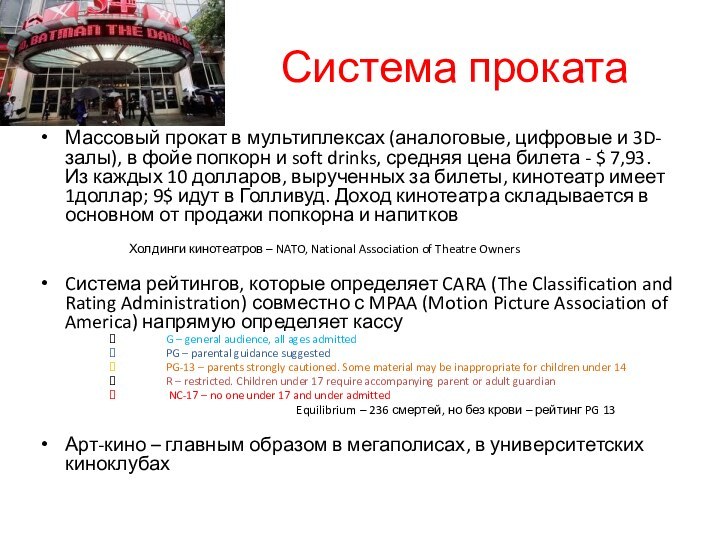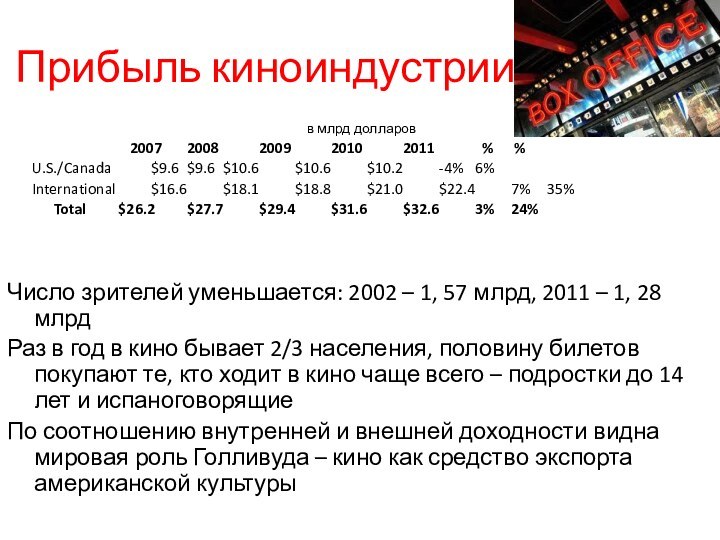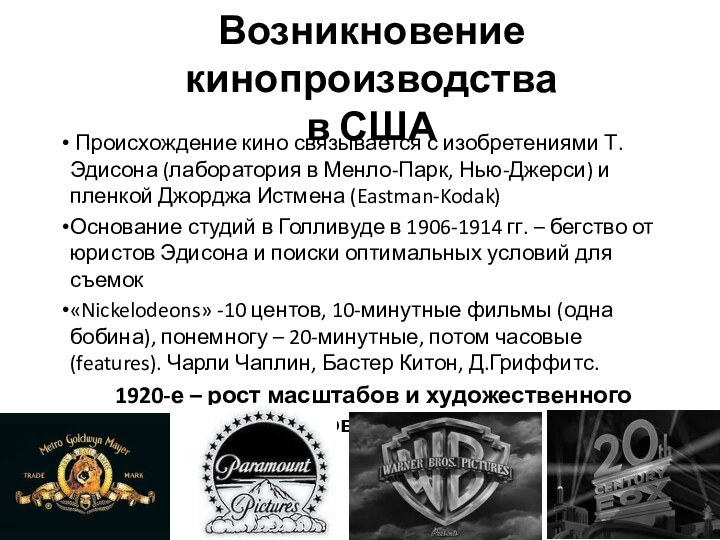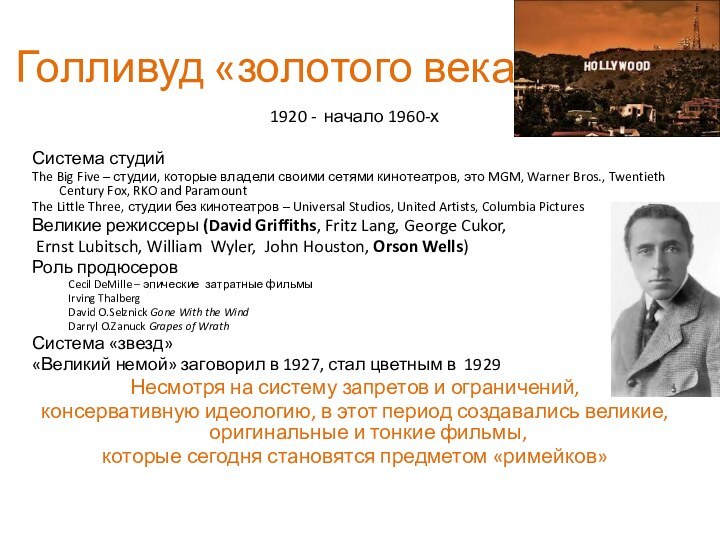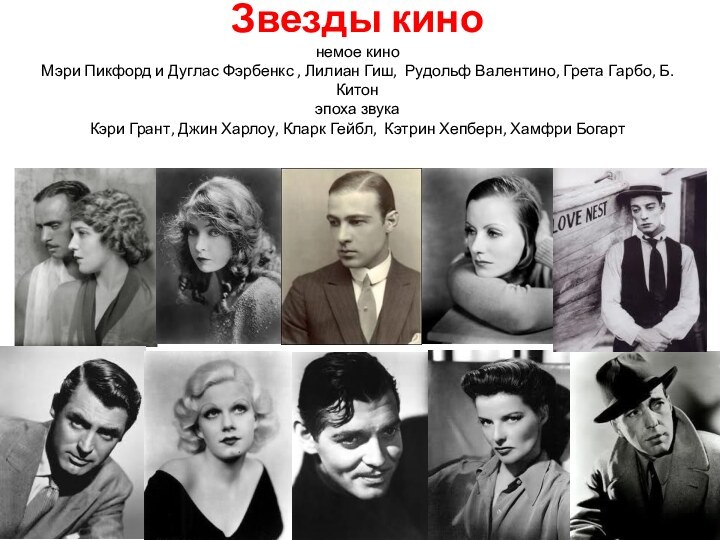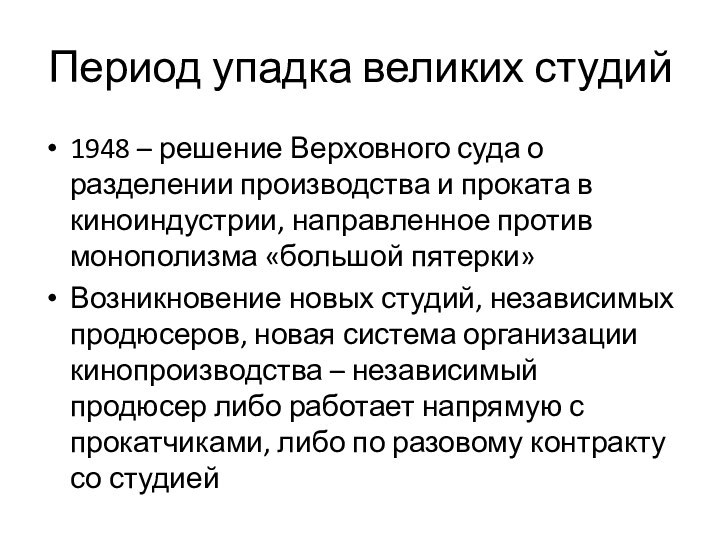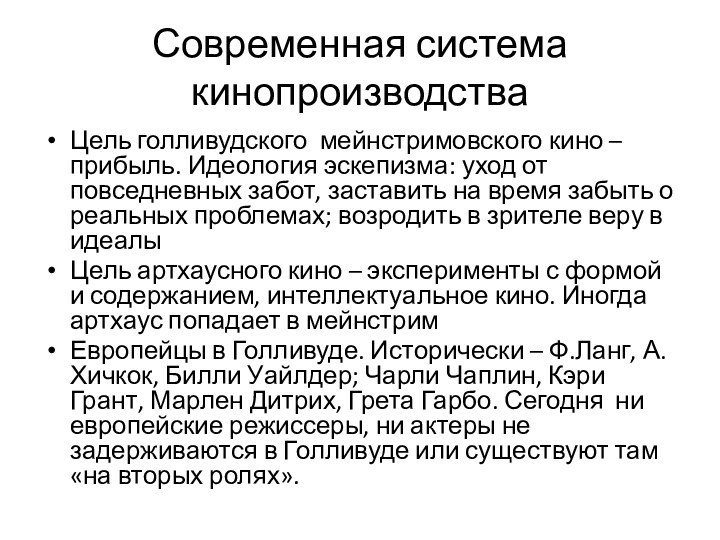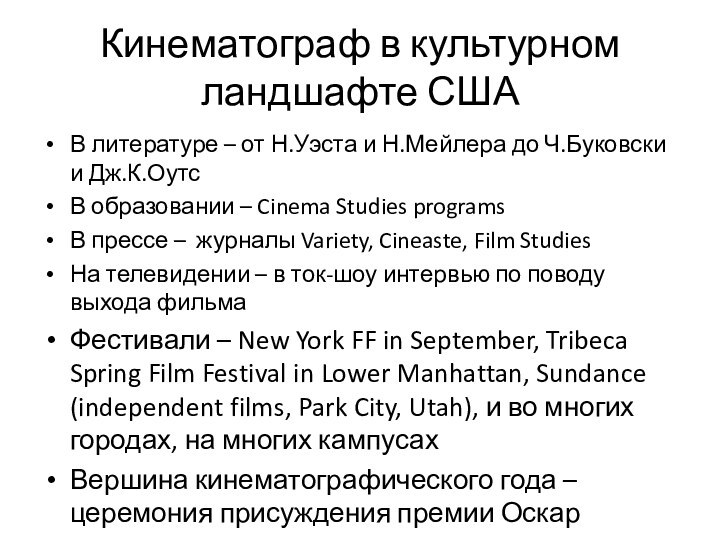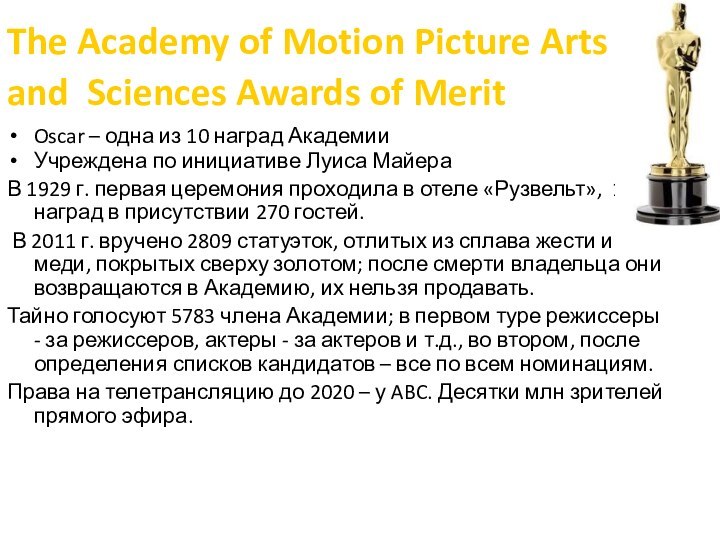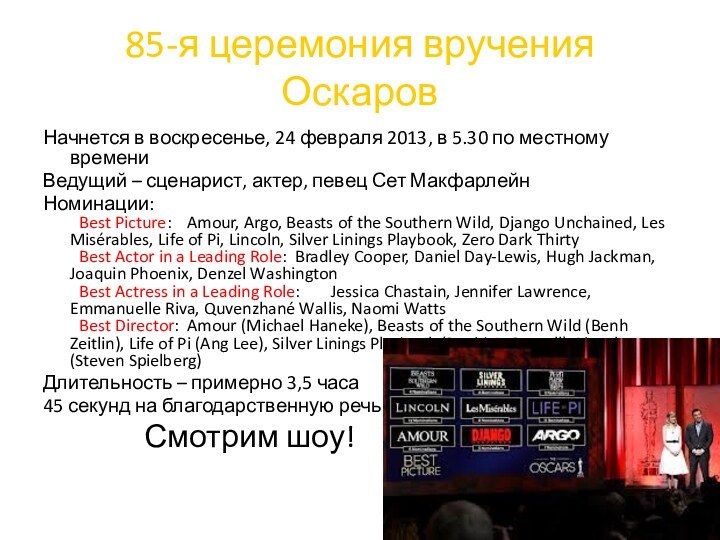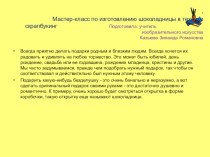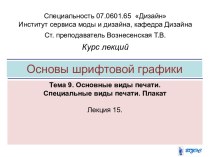Слайд 2
АмеАМ
АмЕРИКАНСКИЙ
КИНЕМАТОГРАФ
Слайд 3
Кинематограф как сектор экономики США
Кинопроизводство – “industry”, дает
работу 2,2 млн человек, свыше 100 000 связанных с
кино предприятий. Крупнейший работодатель в частном секторе экономики США
Непосредственно в процессе кинопроизводства занято 374 тыс. человек
Средство экспорта американской культуры
В год снимается 500-600 художественных фильмов; над каждым фильмом работает несколько сот человек
Слайд 4
Профессии вне съемочной площадки
● Writer-changes intangible ideas
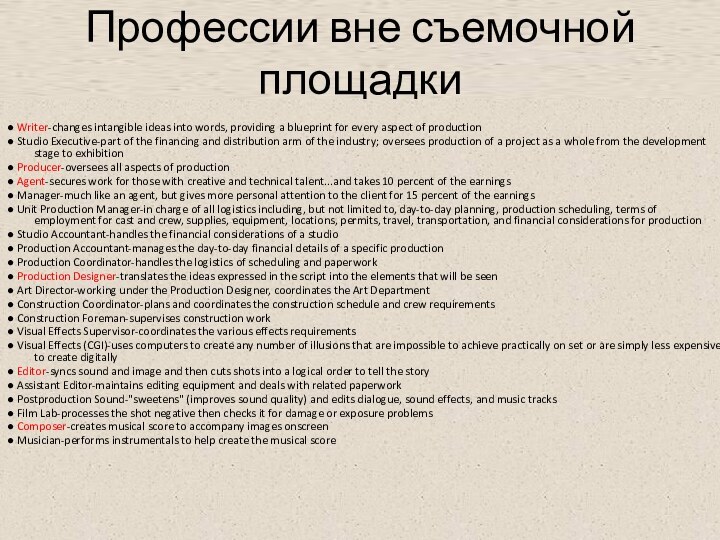
into words, providing a blueprint for every aspect of
production
● Studio Executive-part of the financing and distribution arm of the industry; oversees production of a project as a whole from the development stage to exhibition
● Producer-oversees all aspects of production
● Agent-secures work for those with creative and technical talent...and takes 10 percent of the earnings
● Manager-much like an agent, but gives more personal attention to the client for 15 percent of the earnings
● Unit Production Manager-in charge of all logistics including, but not limited to, day-to-day planning, production scheduling, terms of employment for cast and crew, supplies, equipment, locations, permits, travel, transportation, and financial considerations for production
● Studio Accountant-handles the financial considerations of a studio
● Production Accountant-manages the day-to-day financial details of a specific production
● Production Coordinator-handles the logistics of scheduling and paperwork
● Production Designer-translates the ideas expressed in the script into the elements that will be seen
● Art Director-working under the Production Designer, coordinates the Art Department
● Construction Coordinator-plans and coordinates the construction schedule and crew requirements
● Construction Foreman-supervises construction work
● Visual Effects Supervisor-coordinates the various effects requirements
● Visual Effects (CGI)-uses computers to create any number of illusions that are impossible to achieve practically on set or are simply less expensive to create digitally
● Editor-syncs sound and image and then cuts shots into a logical order to tell the story
● Assistant Editor-maintains editing equipment and deals with related paperwork
● Postproduction Sound-"sweetens" (improves sound quality) and edits dialogue, sound effects, and music tracks
● Film Lab-processes the shot negative then checks it for damage or exposure problems
● Composer-creates musical score to accompany images onscreen
● Musician-performs instrumentals to help create the musical score
Слайд 5
Профессии на съемочной площадке
● Director-generally in charge of
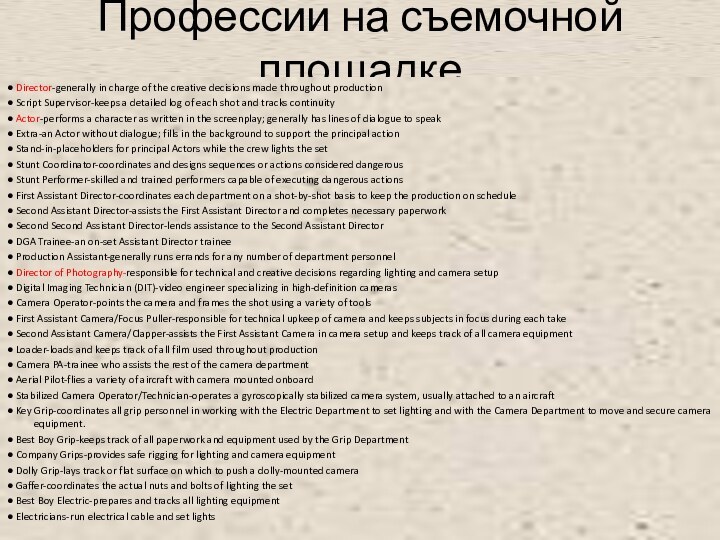
the creative decisions made throughout production
● Script Supervisor-keeps a
detailed log of each shot and tracks continuity
● Actor-performs a character as written in the screenplay; generally has lines of dialogue to speak
● Extra-an Actor without dialogue; fills in the background to support the principal action
● Stand-in-placeholders for principal Actors while the crew lights the set
● Stunt Coordinator-coordinates and designs sequences or actions considered dangerous
● Stunt Performer-skilled and trained performers capable of executing dangerous actions
● First Assistant Director-coordinates each department on a shot-by-shot basis to keep the production on schedule
● Second Assistant Director-assists the First Assistant Director and completes necessary paperwork
● Second Second Assistant Director-lends assistance to the Second Assistant Director
● DGA Trainee-an on-set Assistant Director trainee
● Production Assistant-generally runs errands for any number of department personnel
● Director of Photography-responsible for technical and creative decisions regarding lighting and camera setup
● Digital Imaging Technician (DIT)-video engineer specializing in high-definition cameras
● Camera Operator-points the camera and frames the shot using a variety of tools
● First Assistant Camera/Focus Puller-responsible for technical upkeep of camera and keeps subjects in focus during each take
● Second Assistant Camera/Clapper-assists the First Assistant Camera in camera setup and keeps track of all camera equipment
● Loader-loads and keeps track of all film used throughout production
● Camera PA-trainee who assists the rest of the camera department
● Aerial Pilot-flies a variety of aircraft with camera mounted onboard
● Stabilized Camera Operator/Technician-operates a gyroscopically stabilized camera system, usually attached to an aircraft
● Key Grip-coordinates all grip personnel in working with the Electric Department to set lighting and with the Camera Department to move and secure camera equipment.
● Best Boy Grip-keeps track of all paperwork and equipment used by the Grip Department
● Company Grips-provides safe rigging for lighting and camera equipment
● Dolly Grip-lays track or flat surface on which to push a dolly-mounted camera
● Gaffer-coordinates the actual nuts and bolts of lighting the set
● Best Boy Electric-prepares and tracks all lighting equipment
● Electricians-run electrical cable and set lights
Слайд 6
● Generator Operator-maintains correct electrical output for set
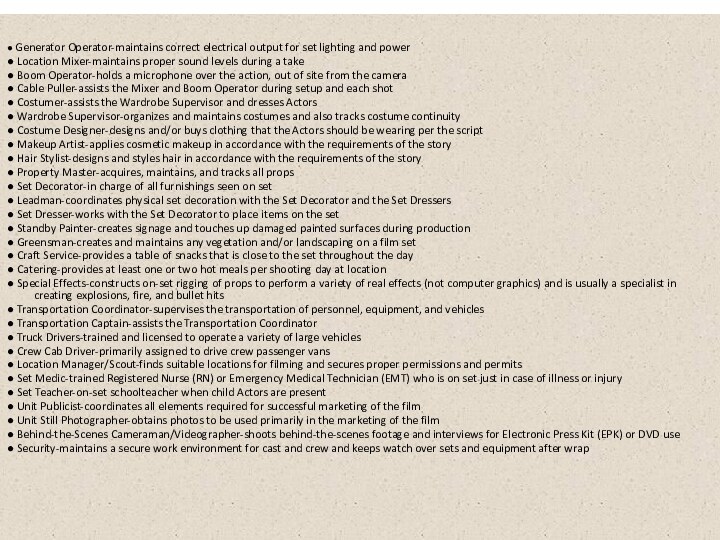
lighting and power
● Location Mixer-maintains proper sound levels during
a take
● Boom Operator-holds a microphone over the action, out of site from the camera
● Cable Puller-assists the Mixer and Boom Operator during setup and each shot
● Costumer-assists the Wardrobe Supervisor and dresses Actors
● Wardrobe Supervisor-organizes and maintains costumes and also tracks costume continuity
● Costume Designer-designs and/or buys clothing that the Actors should be wearing per the script
● Makeup Artist-applies cosmetic makeup in accordance with the requirements of the story
● Hair Stylist-designs and styles hair in accordance with the requirements of the story
● Property Master-acquires, maintains, and tracks all props
● Set Decorator-in charge of all furnishings seen on set
● Leadman-coordinates physical set decoration with the Set Decorator and the Set Dressers
● Set Dresser-works with the Set Decorator to place items on the set
● Standby Painter-creates signage and touches up damaged painted surfaces during production
● Greensman-creates and maintains any vegetation and/or landscaping on a film set
● Craft Service-provides a table of snacks that is close to the set throughout the day
● Catering-provides at least one or two hot meals per shooting day at location
● Special Effects-constructs on-set rigging of props to perform a variety of real effects (not computer graphics) and is usually a specialist in creating explosions, fire, and bullet hits
● Transportation Coordinator-supervises the transportation of personnel, equipment, and vehicles
● Transportation Captain-assists the Transportation Coordinator
● Truck Drivers-trained and licensed to operate a variety of large vehicles
● Crew Cab Driver-primarily assigned to drive crew passenger vans
● Location Manager/Scout-finds suitable locations for filming and secures proper permissions and permits
● Set Medic-trained Registered Nurse (RN) or Emergency Medical Technician (EMT) who is on set just in case of illness or injury
● Set Teacher-on-set schoolteacher when child Actors are present
● Unit Publicist-coordinates all elements required for successful marketing of the film
● Unit Still Photographer-obtains photos to be used primarily in the marketing of the film
● Behind-the-Scenes Cameraman/Videographer-shoots behind-the-scenes footage and interviews for Electronic Press Kit (EPK) or DVD use
● Security-maintains a secure work environment for cast and crew and keeps watch over sets and equipment after wrap
Слайд 7
Стадии работы над фильмом
Написание сценария ( сценарий на
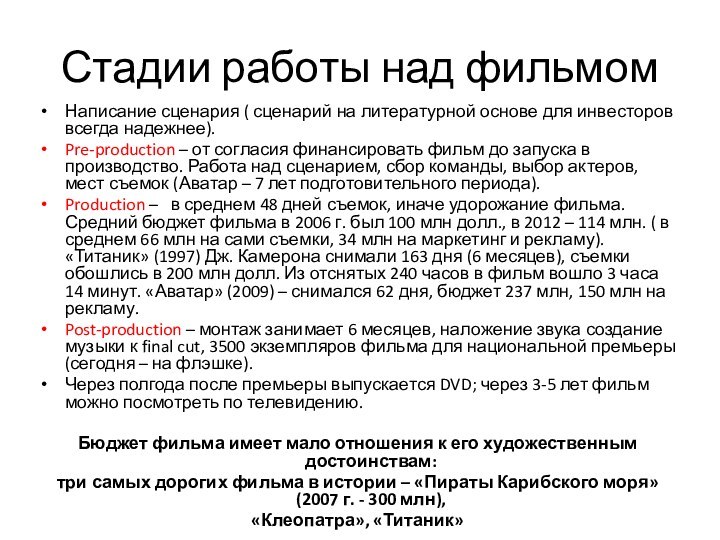
литературной основе для инвесторов всегда надежнее).
Pre-production – от согласия
финансировать фильм до запуска в производство. Работа над сценарием, сбор команды, выбор актеров, мест съемок (Аватар – 7 лет подготовительного периода).
Production – в среднем 48 дней съемок, иначе удорожание фильма. Средний бюджет фильма в 2006 г. был 100 млн долл., в 2012 – 114 млн. ( в среднем 66 млн на сами съемки, 34 млн на маркетинг и рекламу). «Титаник» (1997) Дж. Камерона снимали 163 дня (6 месяцев), съемки обошлись в 200 млн долл. Из отснятых 240 часов в фильм вошло 3 часа 14 минут. «Аватар» (2009) – снимался 62 дня, бюджет 237 млн, 150 млн на рекламу.
Post-production – монтаж занимает 6 месяцев, наложение звука создание музыки к final cut, 3500 экземпляров фильма для национальной премьеры (сегодня – на флэшке).
Через полгода после премьеры выпускается DVD; через 3-5 лет фильм можно посмотреть по телевидению.
Бюджет фильма имеет мало отношения к его художественным достоинствам:
три самых дорогих фильма в истории – «Пираты Карибского моря» (2007 г. - 300 млн),
«Клеопатра», «Титаник»
Система проката
Массовый прокат в мультиплексах (аналоговые, цифровые
и 3D-залы), в фойе попкорн и soft drinks, средняя цена билета - $ 7,93. Из каждых 10 долларов, вырученных за билеты, кинотеатр имеет 1доллар; 9$ идут в Голливуд. Доход кинотеатра складывается в основном от продажи попкорна и напитков
Холдинги кинотеатров – NATO, National Association of Theatre Owners
Cистема рейтингов, которые определяет CARA (The Classification and Rating Administration) совместно с MPAA (Motion Picture Association of America) напрямую определяет кассу
G – general audience, all ages admitted
PG – parental guidance suggested
PG-13 – parents strongly cautioned. Some material may be inappropriate for children under 14
R – restricted. Children under 17 require accompanying parent or adult guardian
NC-17 – no one under 17 and under admitted
Equilibrium – 236 смертей, но без крови – рейтинг PG 13
Арт-кино – главным образом в мегаполисах, в университетских киноклубах
Слайд 9
Прибыль киноиндустрии
в млрд долларов
2007 2008 2009 2010 2011 % %
U.S./Canada $9.6 $9.6 $10.6 $10.6 $10.2 -4% 6%
International $16.6 $18.1 $18.8 $21.0 $22.4 7% 35%
Total $26.2 $27.7 $29.4 $31.6 $32.6 3% 24%
Число зрителей уменьшается: 2002 – 1, 57 млрд, 2011 – 1, 28 млрд
Раз в год в кино бывает 2/3 населения, половину билетов покупают те, кто ходит в кино чаще всего – подростки до 14 лет и испаноговорящие
По соотношению внутренней и внешней доходности видна мировая роль Голливуда – кино как средство экспорта американской культуры
Слайд 10
История кинопроизводства в США
Американцы считают кино
своим национальным
видом искусства,
это - американский эпос,
главный культурный продукт,
предмет гордости,
источник цитат и фразеологизмов,
главное средство культурного досуга
Слайд 11
Возникновение кинопроизводства
в США
Происхождение кино связывается с
изобретениями Т.Эдисона (лаборатория в Менло-Парк, Нью-Джерси) и пленкой Джорджа
Истмена (Eastman-Kodak)
Основание студий в Голливуде в 1906-1914 гг. – бегство от юристов Эдисона и поиски оптимальных условий для съемок
«Nickelodeons» -10 центов, 10-минутные фильмы (одна бобина), понемногу – 20-минутные, потом часовые (features). Чарли Чаплин, Бастер Китон, Д.Гриффитс.
1920-е – рост масштабов и художественного уровня кино
Слайд 12
Голливуд «золотого века»
1920 - начало 1960-х
Система студий
The
Big Five – студии, которые владели своими сетями кинотеатров,
это MGM, Warner Bros., Twentieth Century Fox, RKO and Paramount
The Little Three, студии без кинотеатров – Universal Studios, United Artists, Columbia Pictures
Великие режиссеры (David Griffiths, Fritz Lang, George Cukor,
Ernst Lubitsch, William Wyler, John Houston, Orson Wells)
Роль продюсеров
Cecil DeMille – эпические затратные фильмы
Irving Thalberg
David O.Selznick Gone With the Wind
Darryl O.Zanuck Grapes of Wrath
Система «звезд»
«Великий немой» заговорил в 1927, стал цветным в 1929
Несмотря на систему запретов и ограничений,
консервативную идеологию, в этот период создавались великие, оригинальные и тонкие фильмы,
которые сегодня становятся предметом «римейков»
Слайд 13
Звезды кино
немое кино
Мэри Пикфорд и Дуглас Фэрбенкс ,
Лилиан Гиш, Рудольф Валентино, Грета Гарбо, Б.Китон
эпоха звука
Кэри Грант,
Джин Харлоу, Кларк Гейбл, Кэтрин Хепберн, Хамфри Богарт
Слайд 14
Период упадка великих студий
1948 – решение Верховного суда
о разделении производства и проката в киноиндустрии, направленное против
монополизма «большой пятерки»
Возникновение новых студий, независимых продюсеров, новая система организации кинопроизводства – независимый продюсер либо работает напрямую с прокатчиками, либо по разовому контракту со студией
Слайд 15
Современная система кинопроизводства
Цель голливудского мейнстримовского кино – прибыль.
Идеология эскепизма: уход от повседневных забот, заставить на время
забыть о реальных проблемах; возродить в зрителе веру в идеалы
Цель артхаусного кино – эксперименты с формой и содержанием, интеллектуальное кино. Иногда артхаус попадает в мейнстрим
Европейцы в Голливуде. Исторически – Ф.Ланг, А.Хичкок, Билли Уайлдер; Чарли Чаплин, Кэри Грант, Марлен Дитрих, Грета Гарбо. Сегодня ни европейские режиссеры, ни актеры не задерживаются в Голливуде или существуют там «на вторых ролях».
Слайд 16
Кинематограф в культурном ландшафте США
В литературе – от
Н.Уэста и Н.Мейлера до Ч.Буковски и Дж.К.Оутс
В образовании
– Cinema Studies programs
В прессе – журналы Variety, Cineaste, Film Studies
На телевидении – в ток-шоу интервью по поводу выхода фильма
Фестивали – New York FF in September, Tribeca Spring Film Festival in Lower Manhattan, Sundance (independent films, Park City, Utah), и во многих городах, на многих кампусах
Вершина кинематографического года – церемония присуждения премии Оскар
Слайд 17
The Academy of Motion Picture Arts and Sciences
Awards of Merit
Oscar – одна из
10 наград Академии
Учреждена по инициативе Луиса Майера
В 1929 г. первая церемония проходила в отеле «Рузвельт», 15 наград в присутствии 270 гостей.
В 2011 г. вручено 2809 статуэток, отлитых из сплава жести и меди, покрытых сверху золотом; после смерти владельца они возвращаются в Академию, их нельзя продавать.
Тайно голосуют 5783 члена Академии; в первом туре режиссеры - за режиссеров, актеры - за актеров и т.д., во втором, после определения списков кандидатов – все по всем номинациям.
Права на телетрансляцию до 2020 – у ABC. Десятки млн зрителей прямого эфира.
